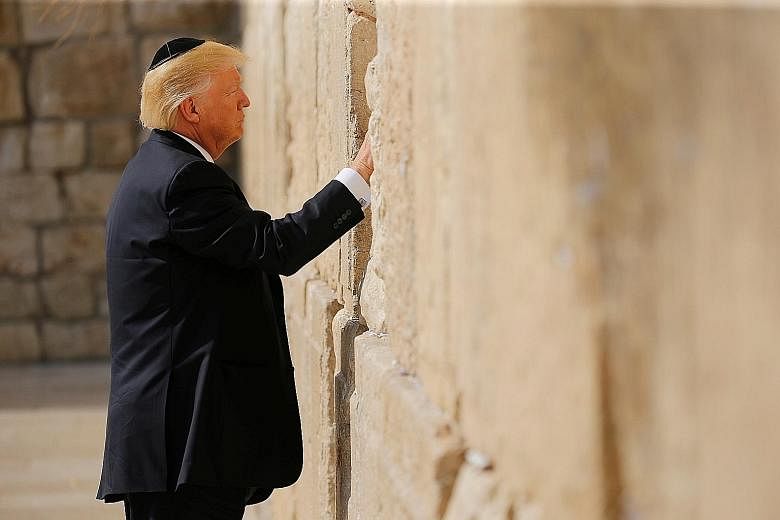JERUSALEM • United States President Donald Trump travelled to Jerusalem yesterday to seek ways to achieve Israeli-Palestinian peace, but also used the visit to lash out at Iran again.
Making history, he became the first sitting US president to visit the Western Wall in the disputed city, placing his hand on one of the most sacred sites in Judaism.
In his meeting with President Reuven Rivlin earlier, Mr Trump stressed that Iran's support of violent groups in the region also presented an opportunity for Israel to come closer to countries in the Gulf, some of which do not have diplomatic relations with Israel.
There is a "growing realisation among your Arab neighbours that they have common cause with you in the threat posed by Iran", Mr Trump told Mr Rivlin.
"The United States and Israel can declare with one voice that Iran must never be allowed to develop nuclear weapons," Mr Trump said. "Never, ever. And (it) must cease its deadly funding, training and equipping of terrorists and militias."
Both Israel and the Sunni leaders of the region consider Iran their arch-enemy.
Responding to the criticism, Iranian President Hassan Rouhani said: "Americans resorted to many different methods against Iran but failed in all... We are waiting for the new government to find stability and continuity in its policies.
"The problem is that the Americans do not know our region and those who advise US officials are misleading them."
After two days in Riyadh, where the US delegation signed multibillion-dollar deals, Mr Trump arrived to a considerably less gilded reception in Israel. Israeli Prime Minister Benjamin Netanyahu had to order his Cabinet ministers to attend the brief ceremony and tried to shove one parliamentarian out of the way as he asked Mr Trump for a selfie.
The status of Jerusalem is ultra-sensitive and has been among the most difficult issues in Israeli-Palestinian peace talks.
Israel occupied East Jerusalem and the West Bank in 1967 in moves never recognised by the international community. It later annexed East Jerusalem and claims the entire city as its capital. The Palestinians see East Jerusalem as the capital of their future state.
The Western Wall, the holiest site where Jews can pray, is the last remnant of the supporting wall of the second Jewish temple, built by King Herod and destroyed by the Romans in AD70. Mr Trump, wearing a black skullcap, paused in front of it yesterday, then placed what appeared to be a written prayer or note between its stones, as is the custom. His daughter Ivanka, who converted to Judaism, also visited the women's side of the wall. Under strict interpretation of Jewish law, men and women must pray separately there.
Today, Mr Trump will cross for a few hours into Palestinian-held territory in Bethlehem, where he will meet Palestinian Authority President Mahmoud Abbas.
Back in Israel, he will tour the Yad Vashem Holocaust memorial and deliver a speech at the Israel Museum - expected to be his longest public remarks during the visit - before departing for the Vatican.
AGENCE FRANCE-PRESSE, BLOOMBERG, REUTERS

